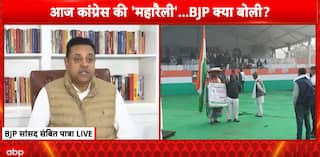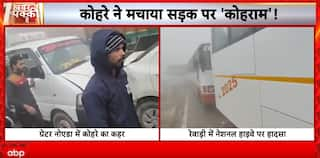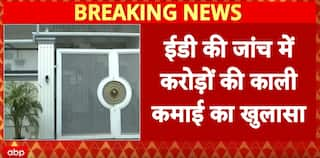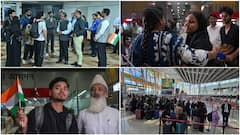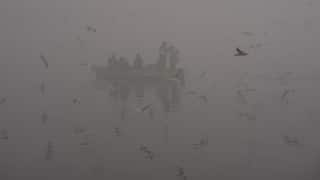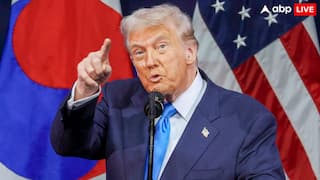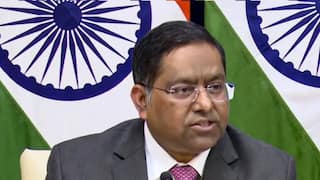Explorer
France Elections: Macron Faces Challenges As Far-Right Poised For Power For First Time Since WWII — Top Points
It is to be noted that a two-round vote could put the far-right in power in France for the first time since the Nazi occupation in World War II.

France elections could shift power to far-right parties.
Source : X/@EmmanuelMacron
Voters across mainland France began casting ballots Sunday in the first round of high-stakes parliamentary elections that could place nationalist, far-right parties in government for the first time since the Nazi era. The outcome of these elections, concluding on July 7, could impact European financial markets, Western support for Ukraine, and the management of France's nuclear arsenal and global military force.
France Faces High Stakes Elections Amid Far-Right Surge: Top Points
- Many French voters are frustrated with inflation, economic concerns, and President Emmanuel Macron's leadership, which they perceive as "arrogant," and "disconnected" from their lives.
- Marine Le Pen's anti-immigration National Rally party capitalised on this discontent, particularly through online platforms like TikTok, and has led in preelection opinion polls, media reports say.
- A new left-wing coalition, the New Popular Front, also challenges Macron's pro-business and centrist alliance, Together for the Republic. This coalition, which includes the French Socialists, Communists, and the hard-left France Unbowed party, promises to reverse a deeply unpopular pension reform that raised the retirement age from 62 to 64, among other economic changes.
- Approximately 49.5 million registered voters are choosing 577 members of the National Assembly, France's influential lower house of parliament, in this two-round voting process, AFP said in a report.
- As per the report, the turnout by midday in the first round was 25.9%, higher than the 18.43% at midday during the 2022 legislative elections, according to interior ministry figures.
- Macron voted in Le Touquet, a seaside town in northern France, along with his wife, Brigitte. Le Pen cast her ballot in her party's stronghold in northern France.
- The vote takes place during the traditional first week of summer vacation in France, and absentee ballot requests were at least five times higher than in the 2022 elections.
- The first polling projections are expected at 8 PM (1800 GMT) when the final polling stations close. As per the AFP report, the early official results are anticipated later Sunday night.
- Macron called the early elections after his party was defeated in the European Parliament election earlier in June by the National Rally, which has historic ties to racism and antisemitism and is hostile towards France's Muslim community. It also has historical connections to Russia, the AFP report said.
- Media reports say that Macron's call was a gamble that French voters, who were complacent about the European election, would turn out for moderate forces in national elections to keep the far right out of power.
- However, preelection polls suggest that the National Rally is gaining support and might win a parliamentary majority.
- If this happens, Macron would be expected to name 28-year-old National Rally President Jordan Bardella as prime minister in an awkward power-sharing system known as "cohabitation".
- Although Macron has stated he will not step down before his presidential term ends in 2027, cohabitation would weaken him both domestically and internationally, the AFP report said.
- The first round's results will reflect overall voter sentiment but might not accurately indicate the final makeup of the National Assembly. The AFP reports say that the predictions are difficult due to the complex voting system and the potential parties to form some constituencies between the rounds.
- Historically, such tactical moves have kept far-right candidates from power, but support for Le Pen's party has significantly increased.
- Bardella, who has no governing experience, has stated he would use the prime minister's powers to prevent Macron from counting on supplying long-range weapons to Ukraine.
- The National Rally has also questioned the right to citizenship for people born in France and seeks to limit the rights of French citizens with dual nationality, which critics argue undermines fundamental human rights and threatens France's democratic ideals.
- Meanwhile, major public spending promises by the National Rally and the left-wing coalition have worried markets and raised concerns about France's heavy debt, already criticised by EU watchdogs.
- In the French Pacific territory of New Caledonia, polls closed earlier due to a curfew extended until July 8 following violence in May. The unrest, which resulted in nine deaths, was sparked by attempts to amend the French Constitution and change voting lists, leading Indigenous Kanaks to fear further marginalisation as they sought independence from France.
- It is to be noted that a two-round vote could put the far-right in power in France for the first time since the Nazi occupation in World War II.
- Voters in France's other overseas territories, including Saint-Pierre-et-Miquelon, Sant-Bartelemy, Saint-Martin, Guadeloupe, Martinique, Guyana, French Polynesia, and those voting at embassies and consular posts across the Americas, cast their ballots on Saturday.
Follow Breaking News on ABP Live for more latest stories and trending topics. Watch breaking news and top headlines online on ABP News LIVE TV
Read more










